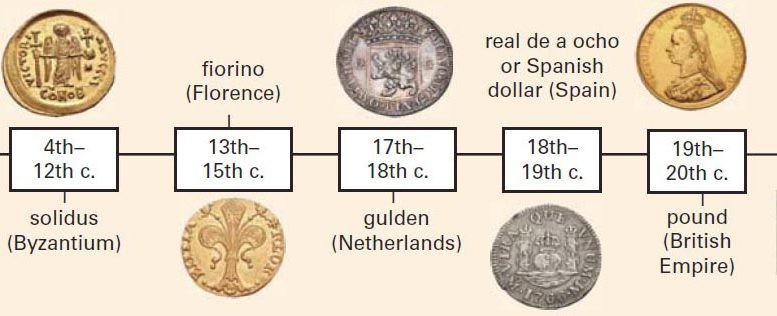The first stage in the development of money can be called the introduction of commodity money. The more intelligent people tried to pick up a highly barterable commodity and use it as medium of exchange. In the hunting society, bows, arrowheads, furs and skins were used as money. In the pastoral stage-the next higher stage of civilization, these objects were replaced by sheep and cattle. Throughout most of Europe and Asia as well as in parts of Africa, animals have played the most important role because of the significance of flocks and herds in the pastoral stage. The use of animals (like cows, goats, sheep) had however, serious disadvantages. Since, all cows and goats are not alike, there could be no standard unit of money. Secondly, the supply of sheep, goats etc. could change abruptly.
The second stage in the development of money was the use of metals as money. As society developed from pastoral to commercial the character of money also changed. Man found that all the defects of commodity money could be removed if metals were used as money. Consequently, metals were used as money. Metals being useful and scarce, have other important properties such as durability, homogeneity, divisibility and portability etc. Therefore, soon the use of metals as money became more or less universal.
According to Stanley Jevons, Of gold and money independent of all convention and law.”By virtues of their being attractive, scarce and useful, gold and silver were university adopted as money even when there was no legal sanction behind them.”
The third stage in the development of money was the discovery of coinage. The use of plain metals as money had certain shortcomings. When metals were used as money, every individual had to find out for himself the value of bits of metals which were used as small amounts of money. This made the specification of value on these cognizability. Some mark had to be put on the different bits of gold or silver to give these standards of value. Thus originated the coinage system. The task of specifying the value was first carried on by merchants. Since coins carried the authority of the kings, it was gradually taken over by the state.
The fourth stage in the development of money was the printing of paper money. Use of metallic coins could be made only with a number of difficulties. The transfer of large sums of money in terms of coins was both inconvenient and risky. This type of money could be easily stolen. Since it was very inconvenient for the travelers to carry ‘money weight’ from place to place, written documents were used as temporary substitutes of money. Any person could deposit money with a wealthy merchant or a goldsmith and get a receipt for the deposit. The wealthy merchants at the distant places would honor these receipts and got the same service in return. These hundies marked the development of paper money. These paper notes gradually took the form of bank notes.
Paper money (issued by the government and central banks) is in fact fiduciary money. Fiduciary money means any form of money which has a value in exchange greater than it’s intrinsic value.
There is also in use what is call Bank Money. This includes the chequing accounts at commercial banks. These can be called money in so far as these are claims of depositors against a commercial bank and can be transferred from one party to another with the use of cheques.
We are entering the electronics age and the next logical development seems to be an electronic monetary transfer system (EMTS). This would eliminate the use of cheques and further reduce the need for currency. Through this system bank deposit balances can be transferred instantaneously to any part of the country by electronic impulses. A country-wide computer network would monitor the credits and debits of all individuals, firms, and governments as transactions take place in the economy. It may appear to be a science fiction for most but Bitcoin and electronic money have already progressed quite far!

Be the first to comment on "The Origin of Money!"